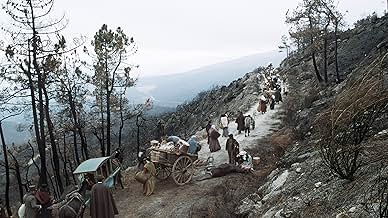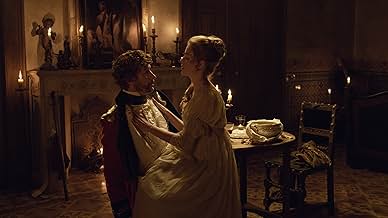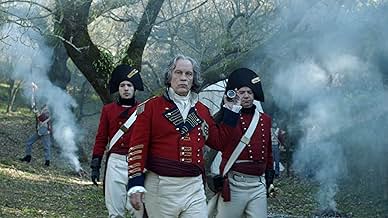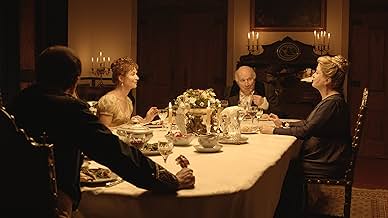CALIFICACIÓN DE IMDb
6.0/10
1.7 k
TU CALIFICACIÓN
Agrega una trama en tu idiomaAn Anglo-Portuguese army led by General Wellington retreats to the fortified lines of Torres Vendras after a battle with Napoleon Bonaparte's army in 1810.An Anglo-Portuguese army led by General Wellington retreats to the fortified lines of Torres Vendras after a battle with Napoleon Bonaparte's army in 1810.An Anglo-Portuguese army led by General Wellington retreats to the fortified lines of Torres Vendras after a battle with Napoleon Bonaparte's army in 1810.
- Premios
- 9 premios ganados y 18 nominaciones en total
- Dirección
- Guionista
- Todo el elenco y el equipo
- Producción, taquilla y más en IMDbPro
Opiniones destacadas
Back to the napoleon invasions the Portuguese people try to refuge ,along with the Portuguese and english army, on the wellington lines, designe by general wellington to prevent the french army to invade Portugal.
The movie doesn't have one linear story. The story is divided until in some points of the storyline they all come together.
The movie has some moments of tension, the photography is very beautiful despite not being very ambitious but it fits and helps the movie to tell the story.
I think the big mistake of this picture is the division of the storyline. I get it that maybe the writers and directors want to give the perspective that there wasn't only one hero, but multiple hero's.
The second mistake is the lack of danger, the only time that we get to experience fear for the life of the characters the problem is very easily solved.
There's some characters that dont bring nothing to the movie, and the ones who make the difference are badly developed because we I already mention the division of the storyline.
Despite all of that the movie as a overall good story, great performances , great shooting. I just feel sorry for the great build up of some situation so at the end as a pretty easy resolution. This movie is a 7 maybe a 7.5.
"As Linhas de Wellington" is a war drama made, in co-production, by Portugal and France, and portrays the final phase of the French Invasions in Portugal. Defeated in the Battle of Bussaco, the soldiers of the French general Massena continue towards Lisbon, forcing the Anglo-Portuguese armies to retreat to the Lines of Torres Vedras, a massive set of artillery fortifications and entrenched paths designed not to let the invader pass, and also, protect a possible British withdrawal from the country. Without means and weapons to force the passage, Massena will come to give up the invasion, retreating to Spain, months later, always chased by British soldiers.
Well, I tend to be a little pessimistic about Portuguese cinema, but considering the big budget of the film and the big names involved in the cast I decided to give it a try. And, I confess, I was impressed by the quality of the final product, much higher than normal for Portuguese cinema.
Let's first talk about the technical details of the film, which I think is one of its strongest points. In fact, it is rare for a film in Portugal to have such good production values. Here we have an excellent photograph, impeccable scenery, excellent costumes and makeup, faithful to the period portrayed, a good job of filming and editing and also a very good soundtrack, which is in your ear. It is perfectly possible to see where so much money has been spent, and well spent. I think the film is a little dark, in that gray is a very present color in photography, but I think it combined well with the plot and ambience of the film.
Another point where the film exceeded my expectations was the cast and their work. The most resonant name is that of John Malkovich, an actor twice nominated for Oscar, well known in Hollywood and who has resided in Portugal for some years. Being the cast's most resonant name, it should have a presence and protagonism in the plot ... but the script is limited to showing Wellington discussing with his painter, in philosophical ramblings about a steak or in moments of meditation, with lighted candles. It is manifestly little work for an actor like Malkovich, which can be a nonsense, depending on the money he earned from the film. Not to mention that, unlike Malkovich, Wellington was younger and had short hair. Also other big names, like Isabelle Huppert, Melvil Poupaud, Catherine Deneuve and her daughter, Chiara Mastroianni, only appear in cameo. That is, the great actors who could boost the film with their talent and give the Portuguese cast something to learn are rarely used, they just appear and help the film to sell. That is, to say the least, stupid.
The real cast, which really appears and represents, is composed of a hard core where we see good Portuguese actors like Nuno Lopes (a sergeant from a Portuguese Battalion of Hunters), Marisa Paredes (a Spanish widow), Carloto Cotta (a Portuguese officer) , Victoria Guerra (a fiery Englishman), Marcello Urgeghe (a British officer), Jemima West (the bride of an English officer who dies in the conflict), Miguel Borges (a usurer merchant), Filipe Vargas (an aristocrat in search of his missing wife ), Adriano Luz (a Portuguese poet, initially at the side of the French, who disappoints and deserts to fight on the Portuguese side) Elsa Zylberstein (a nun), Albano Jerónimo (a priest who takes up arms against the French), Joana de Verona (a woman struggling to avenge her son's death and the abuses she suffered), Gonçalo Waddington (a spy), Maria João Bastos (the aristocrat's wife) and Paulo Pires (a military officer). Everyone was reasonably well, but Nuno Lopes, Jemima West, Adriano Luz and Albano Jerónimo deserve special congratulations for their good work. I would also highlight Joana de Verona, to whom the film reserves one of the most suffered and dramatic characters. Victoria Guerra also does a good job and has an excellent English accent, but the scenes where she appears naked are expendable and could have been cut, had it not been for the bad Portuguese habit of involving sex in everything.
Anyone who expects to see a war film, or a historical film, will certainly be disappointed. The historical personages are limited to appearing fleetingly, the historical facts are portrayed, but the film is not about them. We hardly see a fight scene, with the exception of a few skirmishes. It is a film about ordinary people, whom the war deeply affects, and about their personal dramas. Seen in this light, it is a competent film, which has more quality than the garbage that Portuguese cinema usually presents. But it is far from perfect and there is an underuse of notable actors that is not understood, except for possible issues related to the fee to be paid.
Well, I tend to be a little pessimistic about Portuguese cinema, but considering the big budget of the film and the big names involved in the cast I decided to give it a try. And, I confess, I was impressed by the quality of the final product, much higher than normal for Portuguese cinema.
Let's first talk about the technical details of the film, which I think is one of its strongest points. In fact, it is rare for a film in Portugal to have such good production values. Here we have an excellent photograph, impeccable scenery, excellent costumes and makeup, faithful to the period portrayed, a good job of filming and editing and also a very good soundtrack, which is in your ear. It is perfectly possible to see where so much money has been spent, and well spent. I think the film is a little dark, in that gray is a very present color in photography, but I think it combined well with the plot and ambience of the film.
Another point where the film exceeded my expectations was the cast and their work. The most resonant name is that of John Malkovich, an actor twice nominated for Oscar, well known in Hollywood and who has resided in Portugal for some years. Being the cast's most resonant name, it should have a presence and protagonism in the plot ... but the script is limited to showing Wellington discussing with his painter, in philosophical ramblings about a steak or in moments of meditation, with lighted candles. It is manifestly little work for an actor like Malkovich, which can be a nonsense, depending on the money he earned from the film. Not to mention that, unlike Malkovich, Wellington was younger and had short hair. Also other big names, like Isabelle Huppert, Melvil Poupaud, Catherine Deneuve and her daughter, Chiara Mastroianni, only appear in cameo. That is, the great actors who could boost the film with their talent and give the Portuguese cast something to learn are rarely used, they just appear and help the film to sell. That is, to say the least, stupid.
The real cast, which really appears and represents, is composed of a hard core where we see good Portuguese actors like Nuno Lopes (a sergeant from a Portuguese Battalion of Hunters), Marisa Paredes (a Spanish widow), Carloto Cotta (a Portuguese officer) , Victoria Guerra (a fiery Englishman), Marcello Urgeghe (a British officer), Jemima West (the bride of an English officer who dies in the conflict), Miguel Borges (a usurer merchant), Filipe Vargas (an aristocrat in search of his missing wife ), Adriano Luz (a Portuguese poet, initially at the side of the French, who disappoints and deserts to fight on the Portuguese side) Elsa Zylberstein (a nun), Albano Jerónimo (a priest who takes up arms against the French), Joana de Verona (a woman struggling to avenge her son's death and the abuses she suffered), Gonçalo Waddington (a spy), Maria João Bastos (the aristocrat's wife) and Paulo Pires (a military officer). Everyone was reasonably well, but Nuno Lopes, Jemima West, Adriano Luz and Albano Jerónimo deserve special congratulations for their good work. I would also highlight Joana de Verona, to whom the film reserves one of the most suffered and dramatic characters. Victoria Guerra also does a good job and has an excellent English accent, but the scenes where she appears naked are expendable and could have been cut, had it not been for the bad Portuguese habit of involving sex in everything.
Anyone who expects to see a war film, or a historical film, will certainly be disappointed. The historical personages are limited to appearing fleetingly, the historical facts are portrayed, but the film is not about them. We hardly see a fight scene, with the exception of a few skirmishes. It is a film about ordinary people, whom the war deeply affects, and about their personal dramas. Seen in this light, it is a competent film, which has more quality than the garbage that Portuguese cinema usually presents. But it is far from perfect and there is an underuse of notable actors that is not understood, except for possible issues related to the fee to be paid.
I rent the DVD in hope of getting a movie on Napoleonic warfare and the Portuguese campaign. Actually, this is a collection of soap opera sketches set against the grim background of the general evacuation brought about by the French advance.
This bleak background provides the contrasting point to the light, humorous, often implausible and generally unhistorical approach that characterizes the sketches. They are centered on different individuals involved in the evacuation and they bear an unmistakable (and irritating to me) feminine touch. The character of Wellington is not made an exception and the filmmakers make no attempt to portray his personality or his military abilities.
Another annoying touch is that the French are portrayed as involved in all kinds of base butchery. These acts of cruelty are partly exaggerated; for the part that they are true, no attempt is made to explain that this was the normal trend in this era and that the English and the Portuguese behaved in exactly the same way. Historical exactness plays no part in the movie; since all characters are English or Portuguese and they are presented sympathetically, the director needed some bad guys on the other side of the pond.
In conclusion: a successful attempt at duplicating American soap operas set against a historical background. Go to the box office if you are interested in comedy; don't go if you have any serious penchant for history.
This bleak background provides the contrasting point to the light, humorous, often implausible and generally unhistorical approach that characterizes the sketches. They are centered on different individuals involved in the evacuation and they bear an unmistakable (and irritating to me) feminine touch. The character of Wellington is not made an exception and the filmmakers make no attempt to portray his personality or his military abilities.
Another annoying touch is that the French are portrayed as involved in all kinds of base butchery. These acts of cruelty are partly exaggerated; for the part that they are true, no attempt is made to explain that this was the normal trend in this era and that the English and the Portuguese behaved in exactly the same way. Historical exactness plays no part in the movie; since all characters are English or Portuguese and they are presented sympathetically, the director needed some bad guys on the other side of the pond.
In conclusion: a successful attempt at duplicating American soap operas set against a historical background. Go to the box office if you are interested in comedy; don't go if you have any serious penchant for history.
In 1810 Napoleon sent Marshal Massena (who was famous then and called "the dear son of the victories" I think that by Napoleon himself) to invade Portugal for the third time (French army had been defeated there twice before). The Franch army now entered the center of the country and marched to the south with relative facility despite having been beaten at Buçaco by the Anglo-Portuguese troops who began to withdraw to the south till they reached the Lines of Torres Vedras a huge mass of fortifications built in secret by Wellington in the previous one and half year behind which they entrenched themselves always under Wellington command. The French army after being before the Lines for some time realized they were unconquerable and retreated for good. This movie is about that but who is hoping to see a historical movie may be somewhat disappointed because though the story develops itself having that war as a background it is much more about the personal adventures and misadventures of its characters not only the main ones but some minor ones too. It is very good from the technical standpoint I mean the scenes, camera movements, sequences, angles of view, framings and visual details are very good indeed. The acting is also excellent with a luxury cast with such actors like John Malkovich (as Wellington)and the Portuguese Nuno Lopes. The reproduction of the epoch atmosphere in sceneries and costumes is also excellent. The main flaw that can be appointed to this movie is that the story somehow lacks a thread, losing itself among scattered and diverse episodes although very well shown and developed. And in terms of social usages (certain love scenes for instance) and language employed there is some inadequacy to early 19th century seeming much more as belonging to our contemporary meanings and values.
A superb piece of Portugal cinema. Somewhat slow, however, if you love history you will be enthralled.
¿Sabías que…?
- TriviaDirector Raúl Ruiz died in August 2011 during preproduction. Producer Paulo Branco offered the job of directing to actor John Malkovich, but Malkovich felt he wouldn't be able to do justice to Ruiz's vision, recommending instead Ruiz's widow and long-time collaborator, Valeria Sarmiento.
- ConexionesEdited from As Linhas de Torres Vedras (2012)
Selecciones populares
Inicia sesión para calificar y agrega a la lista de videos para obtener recomendaciones personalizadas
- How long is Lines of Wellington?Con tecnología de Alexa
Detalles
- Fecha de lanzamiento
- Países de origen
- Sitios oficiales
- Idiomas
- También se conoce como
- Lines of Wellington
- Locaciones de filmación
- Productoras
- Ver más créditos de la compañía en IMDbPro
Taquilla
- Presupuesto
- EUR 4,800,000 (estimado)
- Tiempo de ejecución
- 2h 31min(151 min)
- Color
- Relación de aspecto
- 2.35 : 1
Contribuir a esta página
Sugiere una edición o agrega el contenido que falta




































